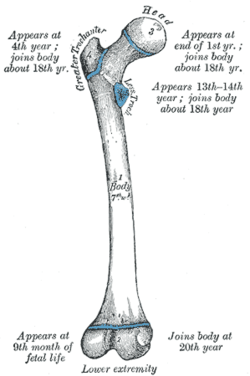Largest body part

A model of a skeleton of a blue whale, the largest animal on earth.
The largest body part is either the largest given body part across all living and extinct organisms or the largest example of a body part within an existing species. The largest animals on the planet are not the only ones to have large body parts, with some smaller animals actually having one particularly enlarged area of the body.
Living animals

Giraffes are instantly recognisable for their long necks.
Blue whale
As the largest animal alive, the blue whale has the largest instance of several body parts.
- Its tongue weighs around 2.7 tonnes (3 short tons)[1]
- Its mouth is large enough to hold up to 90 tonnes (100 short tons) of food and water.[2]
- Its heart typically weighs 600 kg (1,300 lb)[1] and can reach 900 kg (2,000 lb) in exceptional cases[3]
- Its aorta is about 23 centimetres (9.1 in) in diameter.[4]
- The blue whale's penis typically measures 8–10 ft. (2.4 – 3 meters)[5]
Other animals
- The giant and colossal squids have the largest recorded eyes of any living animal, with a maximum diameter of at least 27 cm (11 in).[6] Only the extinct ichthyosaurs are known to have had larger eyes.[6]
- The giraffe has the longest neck of any land mammal.[7]
- The walrus has the largest baculum of any mammal.[8]
- The wandering albatross has the largest wingspan at 3.63 metres (11 feet 11 inches).[9]
- The longest horns ever recorded belonged to a wild water buffalo and measured 4.24 metres (13 feet 11 inches) from tip to tip.[10]
- The largest and heaviest brain belongs to the sperm whale, weighing around 9 kilograms.[11]
- The Arctic lion's mane jellyfish may be the longest animal; the biggest had a bell (body) with a diameter of 2.28 meters (7 feet 6 inches) and the tentacles reached 36.6 m (120 ft). It was found washed up on the shore of Massachusetts Bay in 1870.[12]
- Bootlace worms can reach great lengths. A specimen was measured at 55 m (180 ft) but this may be unreliable as the body is somewhat elastic.[13]
In proportion to body size
- The Morgan's sphinx hawk moth has the longest proboscis in relation to its body size. Its 25–30 cm proboscis is over 3 times longer than its body. It is also known as Darwin's moth because Charles Darwin predicted its existence some 40 years before it was discovered from experiments he did on an orchid with a "foot long" nectary.[14]
- The tube-lipped nectar bat has the longest tongue of any mammal in relation to its body size. Its 85 mm (3.3 in) tongue is 1.5 times longer than its body, and must be kept inside its rib cage.[15]
- The barnacle is the creature with the largest penis as a proportion of its body size.[16]
- Among vertebrates, the Argentine blue-bill duck has the longest penis in relation to its body size.[17]
- The vampire squid has the largest eyes of any animal relative to its size.[18]
- The kiwi lays the largest egg of any bird relative to its size - up to a quarter of the mass of the female.
- Shrews have the largest brain-to-body mass ratio of any animal, with brains that are 10% of body weight. Humans however have the largest encephalization quotient of any animal.[19]
Humans

The Femur is the longest bone in humans
- The longest bone in the human body is the femur.[20]
- The largest artery is the aorta[21] and the largest vein is the inferior vena cava.[22]
- The largest internal organ is the liver.[23] It is also the heaviest organ, with an average of 1.6 kilograms (3.5 pounds).[24]
- The largest external organ, which is also the largest organ in general, is the skin.[25]
- The longest muscle is the sartorius muscle in the thigh.[26]
- The longest single nerve is the sciatic nerve in the thigh, counting its branches and axons.
Individual human records
- The person with the longest tongue is Nick Stoeberl of Salinas, California, United States, whose tongue measures 10.1 centimetres (3.98 in).[27]
- The woman with the longest legs is Svetlana Pankratova. At a height of 200 cm (6.56 ft), her legs measure 132 centimetres (52 in).[28]
- The woman with the longest fingernails is Lee Redmond. The total length of her fingernails is 7.513 meters.[29]
- The longest head of hair belonged to Xie Qiuping of China and measured 5.627 metres (18 feet 5.5 inches) on 8 May 2004.[30]
- The longest beard ever measured belonged to Hans Langseth of Norway; at his death in 1927 it was 5.33 metres (17.5 ft) long.[31][32]
- The longest ear hair belongs to Victor Anthony of India, measuring 18.1 centimetres (7.12 inches).[33]
- The largest feet belonged to Matthew McGrory. His left foot measured 17 inches (43 cm) and he wore size 29 1/2 shoes.
Extinct animals
- The animals with the longest necks, up to 15 metres (49 ft) in some cases, were plesiosaurs (such as Elasmosaurus and Mauisaurus) and sauropod dinosaurs (such as Mamenchisaurus, Sauroposeidon, and Supersaurus).
See also
References
- 1 2 The Scientific Monthly. American Association for the Advancement of Science. 1915. p. 21.
- ↑ Jason de Koning and Geoff Wild (1997). "Contaminant analysis of organochlorines in blubber biopsies from Blue Whales in the St Lawrence". Trent University. Retrieved 29 June 2007.
- ↑ "Animal Bytes - Blue Whale". SeaWorld. Retrieved 27 January 2013.
- ↑ Caspar, Dave (April 2001). "Ms. Blue's Measurements" (PDF). Seymour Center, University of California, Santa Cruz. Archived from the original (PDF) on 2006-09-18. Retrieved 2006-09-01.
- ↑ "Reproduction". University of Wisconsin. Retrieved 3 October 2012.
- 1 2 Nilsson, D.-E.; Warrant, E.J.; Johnsen, S.; Hanlon, R.; Shashar, N. (2012). "A unique advantage for giant eyes in giant squid". Current Biology. 22 (8): 683–688. doi:10.1016/j.cub.2012.02.031. PMID 22425154.
- ↑ "Mammals: Giraffe". San Diego Zoo. Retrieved 27 January 2013.
- ↑ William F. Perrin; Bernd Wursig; J.G.M. 'Hans' Thewissen (26 February 2009). Encyclopedia of Marine Mammals. Academic Press. ISBN 978-0-08-091993-5.
- ↑ "Largest Wingspan Of Any Living Bird". Guinness World Records. Archived from the original on 9 April 2005.
- ↑ "Longest Horns". Guinness World Records. Archived from the original on 23 November 2005.
- ↑ "Physeter catodon, Sperm Whale". MarineBio. Retrieved 27 January 2013.
- ↑ "Giant Jellyfish: Arctic Lion's Mane". Extreme Science. Retrieved 27 January 2013.
- ↑ Carwardine, M. (1995). The Guinness Book of Animal Records. Guinness Publishing. p. 232.
- ↑ Beccaloni, George (23 April 2010). "Darwin and Wallace's Predictions Come True". The Alfred Russel Wallace Website. Retrieved 27 January 2013.
- ↑ "The animal that stows its tongue in its rib cage". Yahoo! News. 6 December 2006. Archived from the original on 13 December 2006.
- ↑ "Biology of Barnacles". Museum Victoria. Archived from the original on 19 July 2006.
- ↑ Mayell, Hillary (23 October 2001). "Evolutionary Oddities: Duck Sex Organ, Lizard Tongue". National Geographic News. Retrieved 27 January 2013.
- ↑ Ellis, Richard (1998). Deep Atlantic: Life, Death, and Exploration in the Abyss. Lyon Press. ISBN 978-1-558-21663-1. Quoted by: Wood, James B. "Introducing Vampyroteuthis infernalis, the vampire squid from Hell". The Cephalopod Page. Retrieved 27 January 2013.
- ↑ Roth, Gerhard; Ursula Dicke (May 2005). "Evolution of the brain and intelligence". Trends in Cognitive Sciences. 9 (5): 250–257. doi:10.1016/j.tics.2005.03.005. PMID 15866152. Retrieved 28 June 2011.
- ↑ Dunleavy, Mara A. "Anatomy and Physiology of the Human Knee Joint". Yale-New Haven Teachers Institute. Retrieved 27 January 2013.
- ↑ "Intro to Blood Vessels". Boston Scientific. Retrieved 27 January 2013.
- ↑ "Re: What is the largest vein?". MadSci Network. Retrieved 27 January 2013.
- ↑ "Organs - Liver". BBC Science & Nature. Retrieved 27 January 2013.
- ↑ Norris, Maggie A.; Siegfried, Donna Rae (2012). Anatomy Essentials for Dummies. John Wiley & Sons. p. 106. ISBN 978-1-118-18421-9.
- ↑ "Skin". National Geographic. Retrieved 27 January 2013.
- ↑ Harris, A. John; Duxson, Marilyn J.; Butler, Jane E.; Hodges, Paul W.; Taylor, Janet L.; Gandevia, Simon C. (2005). "Muscle fiber and motor unit behavior in the longest human skeletal muscle". The Journal of Neuroscience. The Society for Neuroscience. 25 (37): 8528–8533. doi:10.1523/jneurosci.0923-05.2005. PMID 16162934.
- ↑ "Longest Tongue". Guinness World Records. Retrieved 28 April 2017.
- ↑ "Smallest Man Meets Woman with Longest Legs". Associated Press. September 16, 2008. Retrieved 27 January 2013.
- ↑ "Longest Fingernails - Female". Guinness World Records. Retrieved 27 January 2013.
- ↑ "Longest hair". Guinness World Records. Retrieved 27 January 2013.
- ↑ "Longest beard – male". Guinness World Records. Retrieved 27 January 2013.
- ↑ "Hans Langseth". Retrieved 27 January 2013.
- ↑ "Longest Ear Hair". Guinness World Records. Retrieved 27 January 2013.
External links
This article is issued from
Wikipedia.
The text is licensed under Creative Commons - Attribution - Sharealike.
Additional terms may apply for the media files.